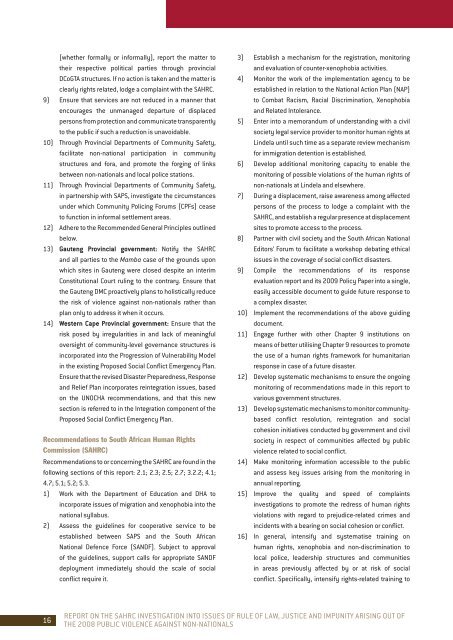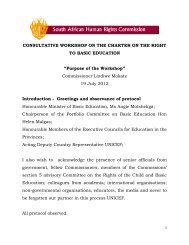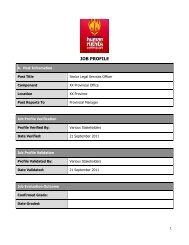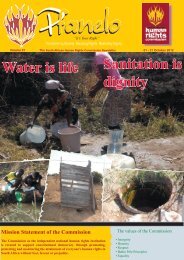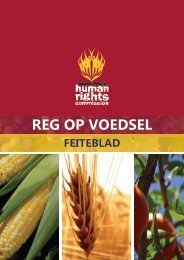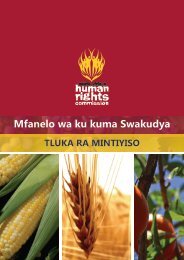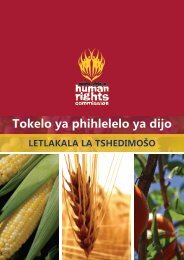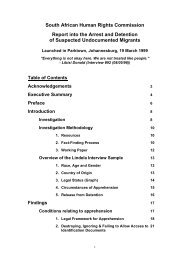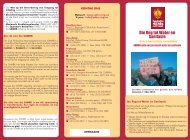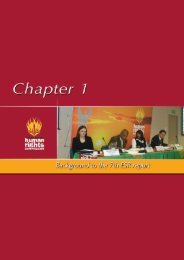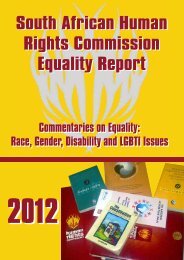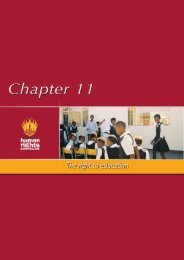Chapter 1 - South African Human Rights Commission
Chapter 1 - South African Human Rights Commission
Chapter 1 - South African Human Rights Commission
You also want an ePaper? Increase the reach of your titles
YUMPU automatically turns print PDFs into web optimized ePapers that Google loves.
(whether formally or informally), report the matter to<br />
their respective political parties through provincial<br />
DCoGTA structures. If no action is taken and the matter is<br />
clearly rights related, lodge a complaint with the SAHRC.<br />
9) Ensure that services are not reduced in a manner that<br />
encourages the unmanaged departure of displaced<br />
persons from protection and communicate transparently<br />
to the public if such a reduction is unavoidable.<br />
10) Through Provincial Departments of Community Safety,<br />
facilitate non-national participation in community<br />
structures and fora, and promote the forging of links<br />
between non-nationals and local police stations.<br />
11) Through Provincial Departments of Community Safety,<br />
in partnership with SAPS, investigate the circumstances<br />
under which Community Policing Forums (CPFs) cease<br />
to function in informal settlement areas.<br />
12) Adhere to the Recommended General Principles outlined<br />
below.<br />
13) Gauteng Provincial government: Notify the SAHRC<br />
and all parties to the Mamba case of the grounds upon<br />
which sites in Gauteng were closed despite an interim<br />
Constitutional Court ruling to the contrary. Ensure that<br />
the Gauteng DMC proactively plans to holistically reduce<br />
the risk of violence against non-nationals rather than<br />
plan only to address it when it occurs.<br />
14) Western Cape Provincial government: Ensure that the<br />
risk posed by irregularities in and lack of meaningful<br />
oversight of community-level governance structures is<br />
incorporated into the Progression of Vulnerability Model<br />
in the existing Proposed Social Conflict Emergency Plan.<br />
Ensure that the revised Disaster Preparedness, Response<br />
and Relief Plan incorporates reintegration issues, based<br />
on the UNOCHA recommendations, and that this new<br />
section is referred to in the Integration component of the<br />
Proposed Social Conflict Emergency Plan.<br />
Recommendations to <strong>South</strong> <strong>African</strong> <strong>Human</strong> <strong>Rights</strong><br />
<strong>Commission</strong> (SAHRC)<br />
Recommendations to or concerning the SAHRC are found in the<br />
following sections of this report: 2.1; 2.3; 2.5; 2.7; 3.2.2; 4.1;<br />
4.7; 5.1; 5.2; 5.3.<br />
1) Work with the Department of Education and DHA to<br />
incorporate issues of migration and xenophobia into the<br />
national syllabus.<br />
2) Assess the guidelines for cooperative service to be<br />
established between SAPS and the <strong>South</strong> <strong>African</strong><br />
National Defence Force (SANDF). Subject to approval<br />
of the guidelines, support calls for appropriate SANDF<br />
deployment immediately should the scale of social<br />
conflict require it.<br />
3) Establish a mechanism for the registration, monitoring<br />
and evaluation of counter-xenophobia activities.<br />
4) Monitor the work of the implementation agency to be<br />
established in relation to the National Action Plan (NAP)<br />
to Combat Racism, Racial Discrimination, Xenophobia<br />
and Related Intolerance.<br />
5) Enter into a memorandum of understanding with a civil<br />
society legal service provider to monitor human rights at<br />
Lindela until such time as a separate review mechanism<br />
for immigration detention is established.<br />
6) Develop additional monitoring capacity to enable the<br />
monitoring of possible violations of the human rights of<br />
non-nationals at Lindela and elsewhere.<br />
7) During a displacement, raise awareness among affected<br />
persons of the process to lodge a complaint with the<br />
SAHRC, and establish a regular presence at displacement<br />
sites to promote access to the process.<br />
8) Partner with civil society and the <strong>South</strong> <strong>African</strong> National<br />
Editors’ Forum to facilitate a workshop debating ethical<br />
issues in the coverage of social conflict disasters.<br />
9) Compile the recommendations of its response<br />
evaluation report and its 2009 Policy Paper into a single,<br />
easily accessible document to guide future response to<br />
a complex disaster.<br />
10) Implement the recommendations of the above guiding<br />
document.<br />
11) Engage further with other <strong>Chapter</strong> 9 institutions on<br />
means of better utilising <strong>Chapter</strong> 9 resources to promote<br />
the use of a human rights framework for humanitarian<br />
response in case of a future disaster.<br />
12) Develop systematic mechanisms to ensure the ongoing<br />
monitoring of recommendations made in this report to<br />
various government structures.<br />
13) Develop systematic mechanisms to monitor communitybased<br />
conflict resolution, reintegration and social<br />
cohesion initiatives conducted by government and civil<br />
society in respect of communities affected by public<br />
violence related to social conflict.<br />
14) Make monitoring information accessible to the public<br />
and assess key issues arising from the monitoring in<br />
annual reporting.<br />
15) Improve the quality and speed of complaints<br />
investigations to promote the redress of human rights<br />
violations with regard to prejudice-related crimes and<br />
incidents with a bearing on social cohesion or conflict.<br />
16) In general, intensify and systematise training on<br />
human rights, xenophobia and non-discrimination to<br />
local police, leadership structures and communities<br />
in areas previously affected by or at risk of social<br />
conflict. Specifically, intensify rights-related training to<br />
16<br />
REPORT ON THE SAHRC INVESTIGATION INTO ISSUES OF RULE OF LAW, JUSTICE AND IMPUNITY ARISING OUT OF<br />
THE 2008 PUBLIC VIOLENCE AGAINST NON-NATIONALS


